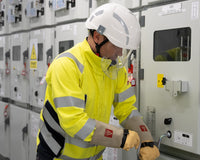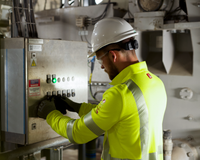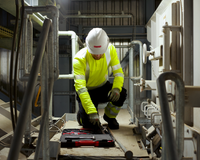NFPA 70E, also known as the standard for electrical safety in the workplace, provides safety-related guidance and best practices for workers in the United States. This standard aims to protect workers from electrical hazards such as shock, arc flash, and arc blast. Compliance with NFPA 70E also helps workers meet OSHA requirements.
The NFPA 70E standard
NFPA 70E, Standard for Electrical Safety in the Workplace, is a National Fire Protection Association (NFPA) standard for the United States. NFPA 70E outlines comprehensive electrical safety-related work practices and the maintenance requirements of electrical equipment, including special equipment.
Originally developed at the request of the Occupational Safety and Health Administration (OSHA), NFPA 70E helps companies and employees avoid workplace injuries and fatalities due to shock, electrocution, arc flash, and arc blast. Compliance with NFPA 70E also assists employers in meeting OSHA requirements, namely OSHA 1910 Subpart S and OSHA 1926 Subpart K. While NFPA 70E is not required by law, it is often referenced and upheld by regulatory bodies such as OSHA.
The NFPA 70E Handbook for Electrical Safety in the Workplace is the recommended resource for workers in electrical fields, ensuring they understand what they need to do to help protect themselves and others on the job. It is recommended that owners and facility managers use this handbook to ensure compliance with NFPA 70E, and reduce the potential for electrical-related accidents, liability, and loss.
NFPA 70E: 2024 edition
The latest edition of NFPA 70E was published in 2024, replacing the previous 2021 standard for electrical safety in the workplace. This standard is regularly updated, ensuring it conforms to the latest safety practices and technological advancements.
The next edition of NFPA 70E is due to be published in 2027, with an annual revision cycle taking place in 2026.
NFPA 70E safety-related work practices
The first chapter of NFPA 70E covers safety-related work practices. This ensures workers understand how to safely perform their work duties when working on or near electrical systems, including de-energised electrical equipment.
The practices and procedures covered in this chapter are intended to ensure employee safety in regards to electrical hazards. As part of this chapter, NFPA 70E outlines:
- Application of safety-related work practices and procedures
- General requirements for electrical safety-related work practices
- Establishing an electrically safe work condition
- Work involving electrical hazards
Overall, the NFPA 70E provides a detailed outline for maintaining safe work practices and procedures that minimise the risks and hazards associated with electrical work.
NFPA 70E safety-related maintenance requirements
Chapter 2 of NFPA 70E outlines the safety-related maintenance requirements for electrical equipment and systems. By following the guidance set by NFPA 70E, workers can ensure equipment is well-maintained and minimise the risk of electrical hazards such as shock, arc flash, and equipment failure.
This chapter shares guidance on how to maintain general electrical equipment such as premises wiring, rotating equipment, and personal safety and protective equipment. While this chapter does not provide specific maintenance methods or test procedures, it outlines the practical safety-related maintenance requirements.
NFPA 70E safety requirements for special equipment
Chapter 3 of NFPA 70E outlines the safety requirements for special electrical equipment in the workplace. This modifies the general requirements provided in earlier chapters of NFPA 70E.
This chapter provides specific safety-related requirements by equipment type, covering:
- Safety-related work practices for electrolytic cells
- Safety requirements related to batteries and battery rooms
- Safety-related work practices: Lasers
- Safety-related work practices: Power electronic equipment
- Safety-related work requirements: Research and development laboratories
- Safety-related requirements for capacitors
By complying with the requirements specified in chapter 3 of NFPA 70E, employers can ensure special electrical equipment is safely operated and maintained.


































